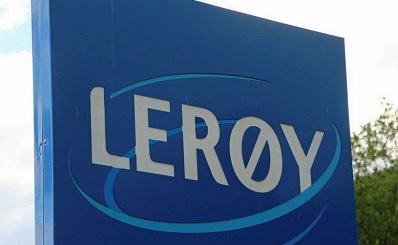News
Increasingly profitable Lerøy concerned by looming salmon tax

Lerøy Seafood Group reported a 44 percent jump in this year’s third-quarter operating profit before fair-value adjustments to NOK 831 million (USD 83.6 million, EUR 80.1 million), citing strong demand and a substantial increase in prices for its main products as the key reasons for the improvement.
The Bergen, Norway-based fish-farming and fishing company’s revenue for the three-month period amounted to a Q3 record NOK 7.4 billion (USD 744.1 million, EUR 713.8 million), up from NOK 6.3 billion (USD 633.5 million, EUR 607.7 million) in Q3 2021.
Lerøy said its Farming segment delivered improved results in the quarter compared to corresponding quarter of 2021, while salmon prices fell significantly since the second-quarter but were still higher than last year. It also confirmed that its harvest volume was in line with Q3 2021, and that inflationary pressure in the economy is affecting its costs. Lerøy Seafood CEO Henning Beltestad said growth in the segment had been “slightly weaker than expected” through the third quarter and at the start of the fourth.
“Accordingly, the outlook for harvest volume has been reduced by 5,000 GWT for 2022," Beltestad said.
Comprising the three regions Lerøy Aurora in Troms and Finnmark, Lerøy Midt in Nordmøre and Trøndelag, and Lerøy Sjøtroll in Vestland, the company’s Farming segment’s Q3 operating profit was NOK 791 million (USD 79.5 million, EUR 76.3 million) in Q3 2022, up from NOK 427 million (USD 42.9 million, EUR 41.2 million) a year previously. It harvested 56,179 metric tons (MT) of salmon and trout in the period, which was 218 MT less than in Q3 2021. Its earnings before interest and taxes per kilogram of NOK 14.10 (USD 1.42, EUR 1.36) increased from NOK 7.60 (USD 0.76, EUR 0.73) in Q3 2021. The company’s Farming segment increased its earnings by NOK 695 million (USD 69.9 million, EUR 67 million) to more than NOK 3.7 billion (USD 371.9 million, EUR 357 million)
According to LSG’s Q3 report, it achieved an average per-kilo price for its salmon in the quarter of NOK 68.70 (USD 6.91, EUR 6.63), compared with NOK 105.40 (USD 10.59, EUR 10.17) per kilogram in Q2 2022, and NOK 54.70 (USD 5.50, EUR 5.28) per kilo in Q3 2021.
Lerøy Wild Catch segment, with higher prices and catch volumes, hit quarterly revenue of NOK 663 million (USD 66.6 million, EUR 64 million), up from NOK 522 million (USD 52.5 million, EUR 50.4 million) in Q3 2021, while its operational profit climbed NOK 10 million (USD 1 million, EUR 965,000) to NOK 27 million (USD 2.7 million, EUR 2.6 million).
With Lerøy Havfisk having 10 trawlers in operation in the quarter, the whitefish catch volume totaled 14,862 MT, compared with 12,336 MT in Q3 2021.
Prices for cod rose 56 percent year-over-year in Q3 2022, while prices for haddock and saithe increased by 20 percent and 41 percent, respectively, according to the firm. Conversely, volatile prices and extreme price shifts on the spot market saw the group’s VAP, Sales & Distribution (VAPS&D) segment's operational profit fall by NOK 103 million (USD 10.3 million, EUR 9.9 million) to NOK 63 million (USD 6.3 million, EUR 6.1 million). Its revenue increased by more than NOK 1 billion (USD 100.5 million, EUR 96.5 million) to more than NOK 7.1 billion (USD 713.3 million, EUR 684.9 million).
LSG said its VAPS&D division’s earnings gradually improved through the quarter, and that it expected a further margin improvement in Q4 2022.
In its Q3 report, Lerøy continued to levy criticism of the Norwegian government’s proposed rent resource tax for salmon farming, stating that it “reveals a lack of insight into the industry's complex value chain,” and is “likely to weaken the demand for and supply of Norwegian salmon.”
The proposal is already having a severely negative impact on Lerøy's day-to-day operations, and will have serious long-term consequences for the group and the industry, Beltestad said. The company has already laid off 339 processing staff and halted a NOK 400 million (USD 40.2 million, EUR 38.6 million) development on Skjervøy that would have increased its processing capacity and employment, and has cancelled the purchase of 614 MT maximum allowable biomass (MAB) from the state at a price of NOK 123 million (USD 12.4 million, EUR 11.9 million), and did not participate in the auction of new license capacity.
"The consequences are extremely serious for Lerøy and our employees, and we expect implementation of the proposal to be delayed to allow time for a thorough consultative process, followed by discussion and broad compromise in the Storting," Beltestad said.
If the tax proposal is not modified, it will take effect on 1 January, 2023, while the deadline for comments is 4 January, 2023, and a final decision by the Storting is likely to be taken during the first half of 2023.Categories
Contact Us
Contact: Yang Lee
Phone: +86 18765203281
Tel: +86 18765203281
Add: No.435, Lanzhou East Road, Jiaozhou, Qingdao, China 266000